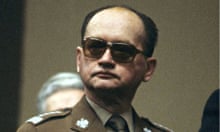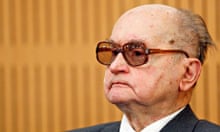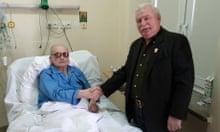Poland's former communist and military leader Wojciech Jaruzelski apologised yesterday for the first time for his role in the Kremlin's invasion of Czechoslovakia 37 years ago.
At the age of 81, the retired general, who also sought to crush the Solidarity movement in his native country and imposed martial law in 1981, used the anniversary of the Red Army invasion of what was then Czechoslovakia to call the event "shameful".
As defence minister of Poland under Soviet control and in a key position in the communist bloc's Warsaw Pact military alliance, General Jaruzelski ordered Polish troops to take part in the invasion, a role that has rankled with Poland's Czech neighbours ever since.
"In 1968 I was the defence minister implementing a political decision, convinced that there were grounds for that on the basis of the information available to us then," he said.
"Today, and naturally much earlier, I realised this decision had been incorrect, wrong, shameful. As I took part in implementing it, I am now offering my sincere apologies," he told Czech national television in an interview yesterday.
Since the 1989 revolutions ending communist and Russian control of eastern Europe, Gen Jaruzelski's historical role has been hugely controversial and divisive, with some seeing him as a lackey of the Kremlin and others as a shrewd and realistic Polish patriot who acted in the national interest to ward off even tougher Kremlin crackdowns in the region.
Yesterday's apology was the first time he had expressed contrition for the Polish participation in the Warsaw Pact invasion of 1968, when the Red Army's tanks entered Prague to crush the liberalising movement known as the Prague Spring.
Ambivalence over Gen Jaruzelski's role remains a sore point in Poland, which is preparing to celebrate the 25th anniversary of the founding of the Solidarity trade union, the first independent trade union in the Soviet bloc, next week.
Within 18 months of its emergence Gen Jaruzelski tried to crush Solidarity by imposing martial law and jailing thousands of activists.
He claims to this day that his actions were the lesser evil - that Soviet troops were mobilising to storm Poland and that his crackdown pre-empted the nightmare scenario of a Russian invasion of Poland.
The disagreement about Gen Jaruzelski's place in Polish and east European history has been exploited in ongoing disputes between Russia and its former satellites in eastern Europe. Warsaw and Moscow, with a long history of enmity, are embroiled in disputes on several fronts.
In the Polish view, the Russian president, Vladimir Putin, sought to humiliate democratic Poland earlier this year when he invited Gen Jaruzelski to the gala events in Moscow for the 60th anniversary of the end of the second world war and conferred a Russian award on him for his role in helping to defeat the Nazis.
The Russian move triggered outrage in Poland, but also in the Czech Republic.
Vaclav Klaus, the president of the Czech Republic, his prime minister and foreign minister all lodged complaints about the Russian treatment of the former Polish leader.
But in Poland efforts have recently been made to bridge the bitter differences. The Solidarity leader, Lech Walesa, who was jailed by Gen Jaruzelski in 1981, recently appeared in a television debate with the general for the first time to discuss the possibility of establishing a South African-style truth and reconciliation commission.
Gen Jaruzelski has long argued in favour of such a commission to air historical grievances and reach consensus about historical facts and who was responsible for what.
In 1968, the career military officer became Polish defence minister and was closely involved in the Warsaw Pact invasion by the Soviet troops and those of three other countries. He became the Polish communist party chief and prime minister in 1981, in the middle of the Solidarity revolution, and declared martial law shortly after.
By 1985 he was president, a post he held until being replaced by Mr Walesa in 1990.


